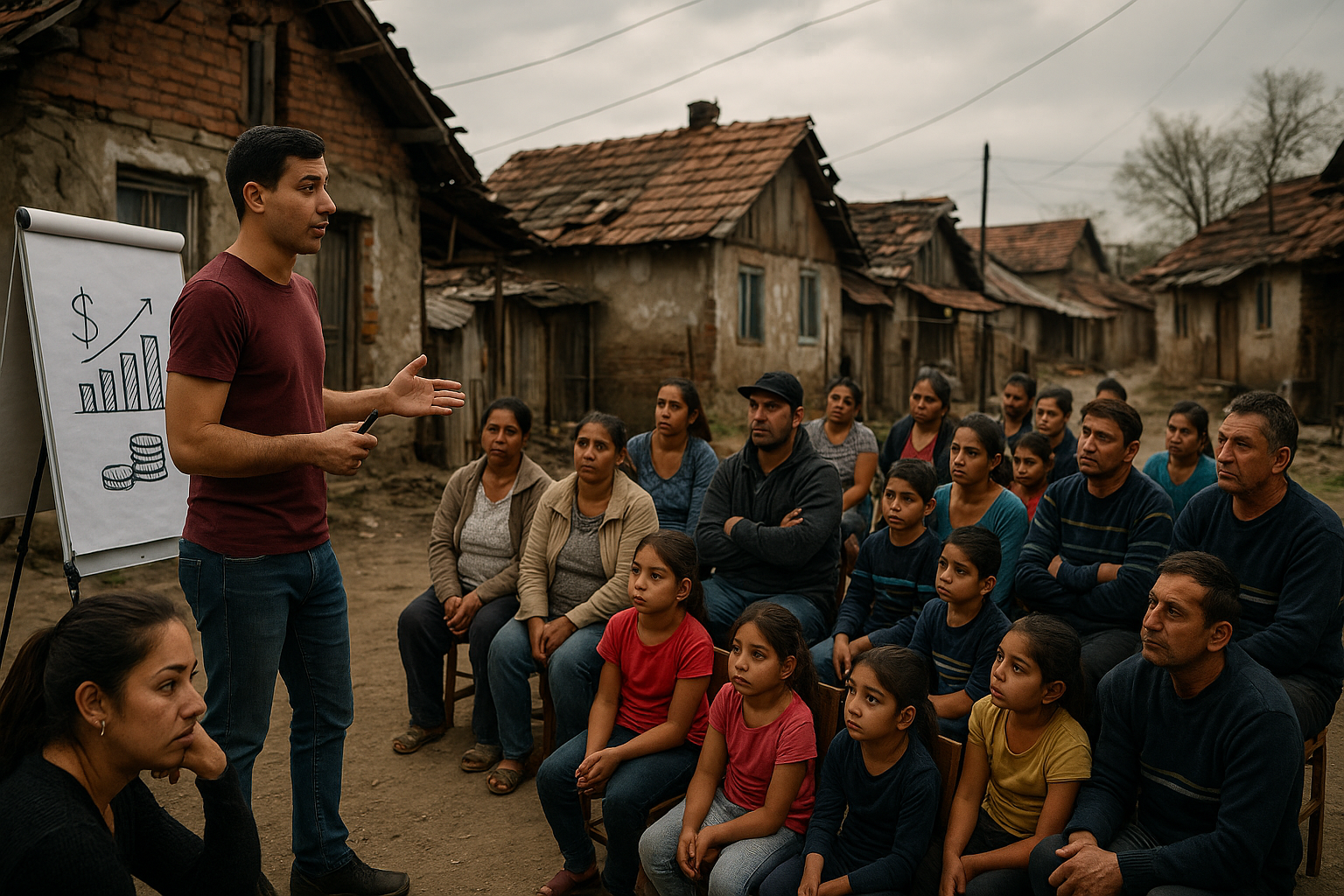Can Financial Literacy Break Poverty? Lessons from Roma Communities Across Eastern Europe
The World Bank-led pilot in Bulgaria, Romania, and Slovakia combined financial literacy training with the Poverty Stoplight self-assessment to boost empowerment and inclusion among marginalized Roma households. Results showed modest gains in financial skills but limited impact on employment or well-being due to short timelines and deep structural barriers.

The World Bank Group’s Social Protection and Jobs Global Practice, in partnership with Fundación Paraguaya and national NGOs in Bulgaria, Romania, and Slovakia, launched an ambitious pilot to improve the lives of marginalized households, particularly Roma communities facing deep-seated poverty and social exclusion. Funded by the European Commission through the Supporting Bulgaria, Romania, and Slovakia to Address Socio-economic Exclusion Trust Fund, the project aimed to go beyond basic welfare by combining financial inclusion with personal empowerment. The model revolved around two key pillars: encouraging a transition from cash to debit or e-pay cards supported by financial literacy training, and implementing the Poverty Stoplight methodology, a structured process of self-assessment, goal-setting, coaching, and service referrals, to help participants identify and address their own needs in a systematic, self-driven way.
Targeting Communities with Varied Challenges
The pilot’s locations were chosen to reflect diverse socio-economic realities and access to services. In Bulgaria, Novi Pazar, Kotel, and the remote village of Gradets presented a spectrum from relatively connected towns to deeply isolated communities, with Roma populations experiencing different degrees of segregation. Romania’s urban sites, Fetești and Slobozia, struggled with informal housing, high unemployment, poor access to education and health services, and heavy reliance on means-tested benefits, amid the introduction of the new Minimum Inclusion Income program. Slovakia’s Bardejov, Spišský Hrhov, and Doľany offered contrasts from service-access hubs to marginalized rural settlements. Implementation timelines varied: 18 months in Bulgaria, 16 in Romania, and 12 in Slovakia, with delays stemming from onboarding partners and navigating data-sharing restrictions.
A Mixed Bag of Evaluation Approaches
Evaluation design depended on the country context and data availability. Romania implemented a randomized control trial (RCT), enabling difference-in-differences impact analysis; Bulgaria used before-and-after trend comparisons, while Slovakia’s assessment was qualitative only. The Poverty Stoplight self-assessment, covering 20 to 41 indicators across income, housing, health, education, participation, and self-reflection, proved more demanding than anticipated for participants with low literacy and limited self-awareness. Facilitator assistance often replaced independent completion, softening the intended self-driven approach. Participants frequently prioritized employment, income, and financial skills, but concrete follow-through on job-related goals was modest, with Bulgaria the only country offering some vocational training, reaching a limited number of people.
Enrolment, Trust, and Community Perceptions
Outreach success varied sharply. Bulgaria and Slovakia achieved uptake rates close to 90 percent, while Romania’s enrollment lagged at around 40 percent, hindered by the “lottery” narrative required for the RCT, frequent facilitator turnover, and lingering mistrust among residents. In certain Bulgarian communities, particularly in Gradets, vouchers intended to incentivize participation overshadowed the program’s developmental goals and led to perceptions of favoritism. In contrast, in Romania and Slovakia, trust in facilitators was generally high, particularly where they had deep community roots and strong institutional ties. Coaching quality varied widely, and caseloads sometimes stretched facilitators thin.
Participants across countries engaged in financial literacy training, often complemented by thematic workshops on parenting, health, debt management, and housing rights. Legal aid for property registration was provided in Bulgaria and Romania, while Slovakia offered sessions on debt resolution and preschool enrollment. However, despite employment being a stated priority for many, systemic barriers, such as low education, scarce local job opportunities, and limited cooperation from employment offices, severely constrained progress.
Results, Lessons, and the Road Ahead
Baseline profiles painted a picture of severe deprivation. Households averaged three to four members, most participants were women in their 30s and 40s, and education levels were low, especially in Romania and Slovakia. Dependence on social benefits was nearly universal. In Bulgaria, most beneficiaries had bank accounts and some experience with cards; in Romania, fewer than one in five households were banked, and confidence in using formal financial services was much lower. Savings and borrowing were minimal in all countries, with informal networks acting as primary lenders. Well-being perceptions were higher in Bulgaria than in Romania, but in both contexts, optimism about future income was common.
Outcome analysis yielded mixed findings. Romania’s RCT showed modest improvements in financial literacy and budgeting confidence but no significant effects on employment, socio-emotional skills, or subjective well-being in the short term. In Bulgaria, trend data indicated reduced outstanding utility debts but declines in saving and budgeting practices. Across the board, the Poverty Stoplight framework helped identify personal and household needs, fostering some progress, but the short implementation window and deep structural challenges limited broader change.
The evaluation’s takeaways highlight that in marginalized communities, lasting results require more intensive and better-supported coaching, with smaller caseloads and stronger outreach strategies to build trust from the outset. Employment-related ambitions need practical pathways, such as vocational training, partnerships with local employers, or targeted activation measures, to move beyond aspiration. While many participants valued the relationships, training, and assistance they received, the pilot’s mixed record underlines the difficulty of translating short-term empowerment into long-term socioeconomic transformation when systemic disadvantages remain unaddressed.
- FIRST PUBLISHED IN:
- Devdiscourse
ALSO READ
Contracting Carbon: The World Bank’s Blueprint for High-Integrity Climate Solutions
Former Romanian President Iliescu, who led free market transition, dies at 95
Carolina Rendón Named World Bank Resident Representative for Dominican Republic
Ion Iliescu: Romania's Divisive Leader and Legacy
World Bank Joins MADE Alliance to Drive Africa’s Digital Transformation










